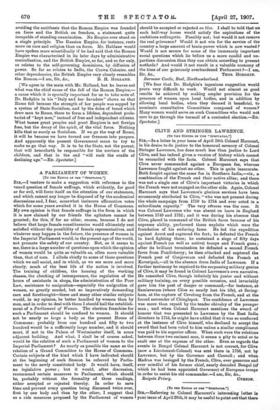CLIVE AND STRINGER LAWRENCE. [To ram EDITOR 07 TIM .SozoraTon.1
SI8,—In a letter in your issue of April 20th Colonel Harcourt, in his desire to do justice to the honoured memory of Colonel
Stringer Lawrence, has done much less than justice to Lord Clive, and has indeed given a version of history which cannot be reconciled with the facts. Colonel Harcourt says that Clive never commanded against a European foe, whereas Lawrence fought against no other. This is quite inaccurate. Both fought against the same foe in Southern India,—viz., a combination of the French and their native allies; and there
was not a single, one of Clive's important victories in which the French were not engaged on the other aide. Again, Colonel
Harcourt says that Lawrence's glorious services have been erroneously attributed to Clive, " who was not present during the whole campaign from 1750 to 1754 and ever acted in a subordinate capacity." The very retverse was the case. It was Colonel Lawrence who was absent on leave in England between 1749 and 1752 ; and it was during his absence that Clive, placed in command of the British force because of his supreme ability, performed those exploits which were the foundation of his enduring fame. He led the expedition against Arcot and captured the fort ; he defeated the French in hard fighting there; he sustained a siege of fifty days against French (as well as native) troops and French guns ; after its brilliant termination he defeated a second French force from Pondicherry; he then attacked and captured the French post of Conjeveram and defeated the French at Kaveripak,—all in the absence. from India of Lawrence. If a further testimony be required to the surpassing military genius of Clive, it may be found in Colonel Lawrence's own narrative.
He consulted Clive, though infinitely his junior and without
military training, on every possible occasion, and invariably gave him the post of danger or command,—for instance, at Samiaveram (where Clive so nearly lost his life), at Sering- ham, at the capture of Covelong from the French, and at the forced surrender of Chingleput. The confidence of Lawrence was more than repaid by the tender chivalry of the younger man ; and when Colonel Harcourt mentions the sword of honour that was presented to Lawrence by the East India directors in 1754, he might have added that it was so conferred at the instance of Clive himself, who declined to accept the sword that had been voted to him unless a similar compliment was paid to his superior officer. When such were the relations between these two eminent men, it seems a pity to extol or to exalt one at the expense of the other. Even as regards the events in Bengal Colonel Harcourt is not correct, for Clive (now a Lieutenant-Colonel) was sent there in 1756, not by Lawrence, but by the Governor and Council ; and when
Madras was besieged by the French, Clive, ever generous and ever mindful of his former chief, nearly denuded Bengal (of which he had been appointed Governor) of European troops in order to assist his old commander.—I am, Sir, &c.,


























































 Previous page
Previous page